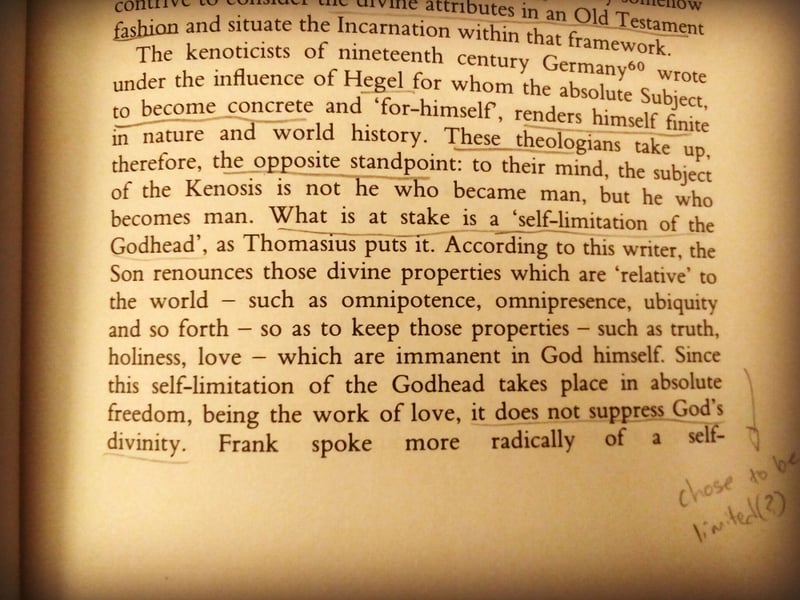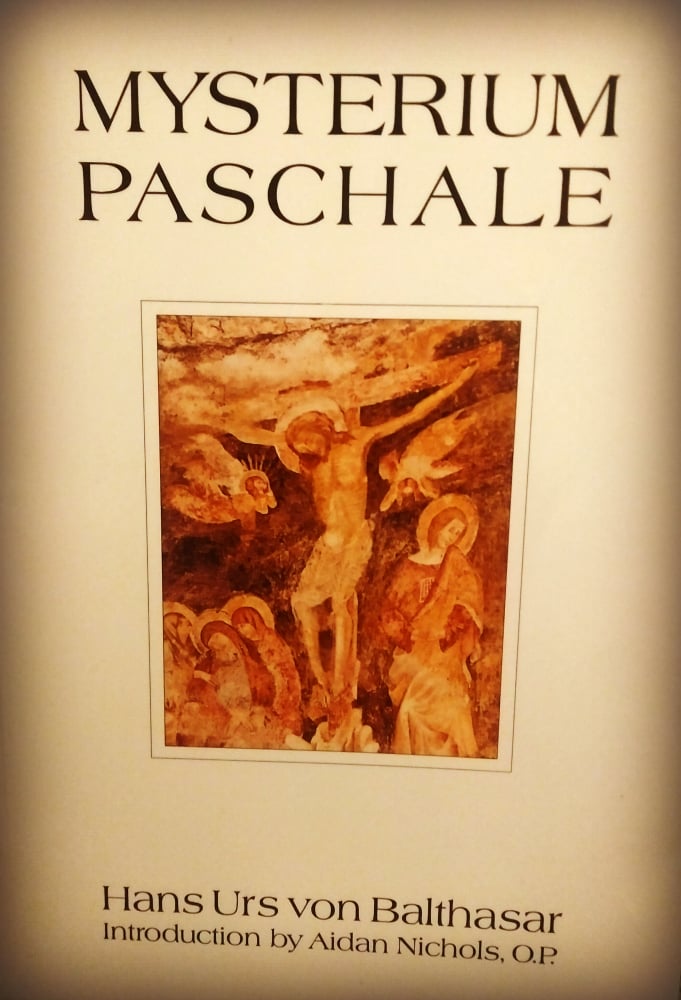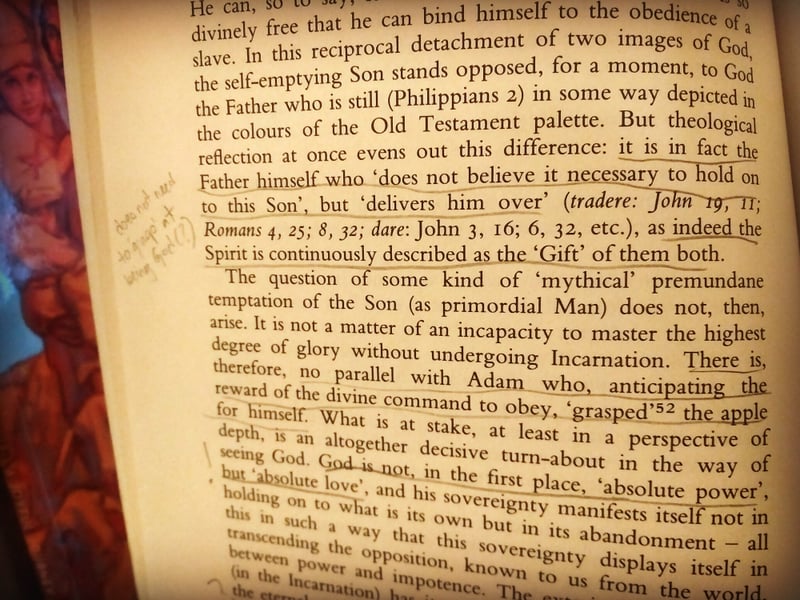Hans Urs von Balthasar. I would not be kidding if I told you that I had a period of my pre-marital life where I considered naming my first son Balthasar for this man. Thankfully I realized ‘Balthy’ is not a terribly admirable nickname, but I have been deeply influenced by this man’s theology of the Paschal Mystery, intertwined with Jesus' life as the fully human son of God.
A brief introduction: Hans Urs von Balthasar is a moderately recent theologian: he was born in 1905 and died in 1988. He was a Swiss theologian, very educated, and very prolific in his writings. Balthasar went through some trials mid-life, but his reputation for his work and theology brought him recognition by popes as well as the intellectual world. Along with Joseph Ratzinger, he was one of the main founders of the scholarly theological magazine, Communio. Von Balthasar was called by Pope John Paul II to be a cardinal, but he died just two days before the ceremony was to take place.
Balthasar drew me into unfathomable discussions around the concept of divine self-emptying, or kenosis. I really mean that - in no part of my history had I thought discussions about Jesus' becoming human could be so, so deep. In his book, Mysterium Paschale, Balthasar expounds upon the depth of God’s self-giving, so scandalous a thing. Many Christians today are still scandalized at the thought of how empty God became of divinity. In no way does Jesus' full humanity deny his full divinity, and that is one amazing thing.
[tweet "Recognizing the depth of Jesus' humanity #kenosis by @janekorvemaker"]
This reflection on Jesus' humanity is my own synthesis of Balthasar's teaching in Mysterium Paschale and through my theology degree; it continues to shape the way I view Jesus' entry into humanity as the point of salvation. Many Christians unknowingly preach a heresy that denies the full humanity of Jesus. Balthasar doesn't address this head-on, but in his exploration of kenosis we see how utterly impossible it is for Jesus to have exploited his divinity while choosing to be fully human.
Why Do We Believe Jesus Was Fully Human?
It is easiest to look at Jesus this way through Scripture. Here, the vindicating lines in Scripture (a part of the Philippians hymn) break open our own presuppositions about Jesus maintaining his divine powers as a human:
Let the same mind be in you that was in Christ Jesus,
who, though he was in the form of God,
did not regard equality with God
as something to be exploited,
but emptied himself,
taking the form of a slave,
being born in human likeness.
And being found in human form,
he humbled himself
and became obedient to the point of death—
even death on a cross.(Philippians 2:5-8, NRSV)
This is nearly intolerable to many Christians I know. Jesus didn’t know he was going to be raised on the third day? No. Our Lord didn’t know that everything he was saying and doing would lead to his death by crucifixion right from the get-go? Uh, most definitely not. I mean, there was good reason he spent so much time in prayer, right? And it was his closeness to his Father through that prayer that led him to act a certain way in his life (just as prayer also affects our own acts). But to suppose he carried a preconceived understanding of his life would take away his humanity. We too have no preconceived knowledge of our lives and how they will unfold.
You see, Jesus was human. Contrary to the popular Christmas hymn Silent Night, he probably did cry as a baby. It is the human thing to do as a newborn. He likely did not walk on water as a baby. Or tell people ominous things about their lives that kids normally wouldn’t know. Jesus was human – fully human- and that is still scandalous today. There were other gospels written about Jesus; we know them as apocryphal gospels, and they were specifically denied from the canon of Scripture in large part because they failed to recognise Jesus’ humanity. Instead, they wove stories of near magical abilities that essentially deny Jesus’ kenosis, the divine self-emptying.
He did not regard equality with God as something to be exploited. (Phil 6)
Another translation uses the term ‘grasped at’ in place of exploited. The thing is this – Jesus did not need to grasp desperately to his triune identity. The reason? He chose to give it up for us. Does this diminish his divinity at all? No; if anything it speaks to his divinity that he is able to do such a task and set himself to carry it out. It speaks more of divine freedom to be able and willing to chose such humility because of love, and not regard equality with God as something to be exploited.
And being found in human form, he humbled himself and became obedient. (Phil 7-8)
He humbled and accepted the terms for our salvation – being human. His faith, though, was outstanding. His closeness to the Father – tight. It was through these human experiences lived to the full (meaning we too can live to the full like Jesus, Mary, and the saints do) that brought about such an exceptionally human life. He truly was humanity fully alive. His faith in his Father was profound and his unity of spirit with the Father’s will is what brought about the miracles and Jesus’ mercy. Through his closeness with the Father he was able to share the divine life with us.
And became obedient to the point of death – even death on a cross. (Phil 8)
Even as Jesus became aware that his preaching and healings were leading him to a path that would eventually lead to his death, he did not stop. His closeness to the Father had revealed his mission, he knew what he was called to do and he fulfilled his duty. Even though he saw his actions were, essentially, pissing off those who ran the spiritual life of the Jewish people. He heard that the leaders were very displeased with him, but he didn't let their judgement come between himself and his discerned mission.
Could he have stopped it all? Could he have saved his own life from death? If we truly believe in kenosis, that which is revealed in the Philippians hymn, then no, he could not have. He did not want his divinity exploited, he humbled himself to be fully human, and therefore his lot in life was to be the same as ours. If his actions led to death, then in being true to his commitment to the salvation of humanity, there was nothing he could do to save himself. He was fully human. And so Jesus died on the cross.
And we know that his death was not the end. From there, the Father raised him up. Balthasar has a most unique and beautiful way of looking at the theology of Holy Saturday, meditating on what it truly means that the Son of God is dead and the silence and emptiness of the day. But that reflection is for another day, once we ruminate on this Jesus, fully God and human.
Are you intrigued? How does the teaching of kenosis, the divine self-emptying, inform your own personal theology?
Copyright 2017 Jane Korvemaker
About the Author

Jane Korvemaker
Jane Korvemaker loves food, family, wine, and God (perhaps not in that order). She holds a Certificate in Culinary Arts, which pairs perfectly with her Bachelor in Theology. A former Coordinator of Youth Ministry, she writes from the beautiful and cold province of Saskatchewan, Canada. She works from home and takes care of her three very hard-working children. Jane regularly blogs at AJK2.ca.





.png?width=1806&height=731&name=CatholicMom_hcfm_logo1_pos_871c_2728c%20(002).png)
Comments